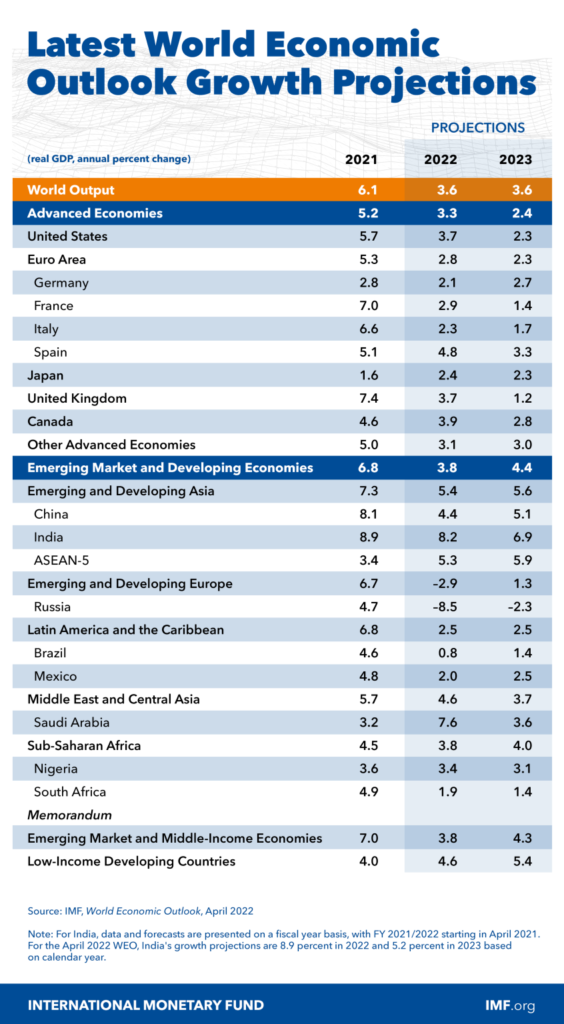Here we will explain inflation and global growth and we will link them to the most recent events in the world.
Inflation by definition is increasing products prices over time, which is healthy for economies until a certain level. Inflation currently in most countries is way above the healthy rates, which affects individuals’ ability to utilize their income efficiently and undermines currencies exchange rates.
COVID-19 Pandemic and supply chain interruption are reasons that sparked the inflation rates globally, but nothing accelerated inflation rates and slowed global growth the way the Russian war did.
Inflation Cycles
The inflation rate in the United States is the highest since 1981, which was a year before the rescission of 1982-1983. Meanwhile, the inflation rate in England is the highest in 30 years, which was a few months before the recession of 1990 through March 1991. Do we expect a new recession?
Over history, recission hit in cycles. Each cycle between recessions was 10-15 years (1981,1990, 2000, and the great recession of 2008). This means the answer is “Yes, we should expect a new recession”.
Every cycle we see the same sequence of events, inflation rates go high, central banks increase their interest rates, equity markets fly high, and then an economic free fall.
Major Economies Inflation
United States:
The Consumer Price Index in the United States rose 8.5% for the 12 months ending March 2022, the largest 12-month increase since December 1981. The all items less food and energy index rose 6.5%, the largest 12-month change since the period ending August 1982. The energy index rose 32.0% over the last year, and the food index increased 8.8%, the largest 12-month increase since the period ending May 1981. (Source: www.bls.gov)
United Kingdom:
Moreover, in the United Kingdom, the Consumer Prices Index including owner occupiers’ housing costs (CPIH) rose by 6.2% in the 12 months up to March 2022, up from 5.5% in February. Moreover, the Consumer Prices Index (CPI) rose by 7.0% in the 12 months up to March 2022, up from 6.2% in February. (Source: www.ons.gov.uk).
Eurozone:
Euro area annual inflation was 7.5% in March 2022, up from 5.9% in February according to the statistical office of the European Union (Eurostat). Energy has the highest annual rate in March (44.7%, compared with 32.0% in February), followed by food, alcohol & tobacco 5.0%, and non-energy industrial goods 3.4%.
In all three regions covered previously, Energy was the major contributor to the increase in CPI figures, but in Europe, it has the highest effect. The reason why the European Union is suffocating under energy prices is due to the dependency on Russian energy. Matter of fact, Russia is the major gas supplier to Europe. However, The U.S., Europe, and other countries phased sanctions on Russia which interrupted the energy and supply chain.
Recent Inflation Drivers
Inflation or prices increase is healthy for economies as long as it is under control. However, some events drive prices high and inflation rates go out of control.
Russian War
Russia’s invasion of Ukraine that started on February 24 affected the entire world. As IMF said, “Global economic prospects have been severely set back, largely because Russia invaded Ukraine”.
In another paragraph also “beyond its immediate and tragic humanitarian impact, the war will slow economic growth and increase inflation. Overall economic risks have risen sharply, and policy tradeoffs have become even more challenging”.
The effect of the Russian war goes beyond the risk that drove safe havens prices up. Russia is a major supplier of oil, gas, and metals, and, together with Ukraine, of wheat and corn. Reduced supplies of these commodities have driven their prices up sharply. And as a result, the surge in food and fuel prices will hurt lower-income households globally.
COVID-19 and Oil Supply
COVID-19 hit the global economy hard enough. Above all it interrupted the global supply chain, drained individuals’ resources and forced companies out of business.
China, one of the world’s most important exporters and shipping hubs, has been on a lockdown for a while and has rarely been able to recover from the pandemic. In its last report, the IMF said, “The latest lockdowns in China could cause new bottlenecks in global supply chains”.
Crude oil prices ballooned after reducing COVID-19 measures in most countries. As a result, fuel consumption increased extensively while the production rate was much lower than the demand. However, the latest COVID-19 outbreak in China dropped fuel consumption to a level that stressed oil producers.
Additionally, OPEC+ set their monthly crude oil production increase to 400 thousand bpd at average production of 77 million bpd. Meanwhile, the global crude oil consumption average is 97 million bpd (source: www.eia.gov). This supply and demand gap drove products and commodities prices to historical records.
Inflation and global growth
The Russian war reduced market sentiment and hindered the global economy’s recovery from the pandemic. Even before the war, inflation had been rising due to supply-demand imbalances prompting a tightening of monetary policy.
Compared to January forecast, IMF has revised its projection for global growth downwards to 3.6% in both 2022 and 2023. The growth outlook for the European Union has been revised downward by 1.1% points. Due to the indirect effects, the war was considered as the second-largest contributor to the overall downward revision.
IMF Global Growth numbers

Tags
Open Live Account
Please enter a valid country
No results found
No results found
Please enter a valid email
Please enter a valid verification code
1. 8-16 characters + numbers (0-9) 2. blend of letters (A-Z, a-z) 3. special characters (e.g, !a#S%^&)
Please enter the correct format
Please tick the checkbox to proceed
Please tick the checkbox to proceed
Important Notice
STARTRADER does not accept any applications from Australian residents.
To comply with regulatory requirements, clicking the button will redirect you to the STARTRADER website operated by STARTRADER PRIME GLOBAL PTY LTD (ABN 65 156 005 668), an authorized Australian Financial Services Licence holder (AFSL no. 421210) regulated by the Australian Securities and Investments Commission.
CONTINUEImportant Notice for Residents of the United Arab Emirates
In alignment with local regulatory requirements, individuals residing in the United Arab Emirates are requested to proceed via our dedicated regional platform at startrader.ae, which is operated by STARTRADER Global Financial Consultation & Financial Analysis L.L.C.. This entity is licensed by the UAE Securities and Commodities Authority (SCA) under License No. 20200000241, and is authorised to introduce financial services and promote financial products in the UAE.
Please click the "Continue" button below to be redirected.
CONTINUEError! Please try again.



















